- Home
- P J Parrish
An Unquiet Grave (Louis Kincaid Mysteries) Page 6
An Unquiet Grave (Louis Kincaid Mysteries) Read online
Page 6
“That’s E Building up ahead,” Alice said.
It was four stories and like the others, red brick with high chimneys, fronted by a plainer version of the administration building portico. All the windows on the second and third floors were barred, but the ground-floor ones were covered with heavy steel gratings. As they got closer, Louis could see that some of the ground-floor window gratings had been pried loose.
“Vandals,” Alice said as they went up the steps. “This building has been closed for over two years.”
She paused at the door and shifted her ring of keys to find the right one. It appeared to Louis that the original door might have been wooden but its replacement was heavy steel, with peeling paint that looked like some of the doors he had seen in prisons.
He glanced back. They were about a quarter mile from the main building and closer now to the heavy trees that abutted the back of the property. On the wind, he caught a hint of water and wondered if the lake was nearby.
“It’s stuck,” Alice said.
Louis used both hands to pull on the door and it opened slowly, the bottom scraping on the concrete. He followed Alice inside. She drew to a stop in the lobby.
“Oh my,” she said softly. “I didn’t know it was this bad.”
The cold air was thick with mildew and dust and something else that smelled medicinal, but aged. The only light came from two front windows, a feeble spray of gray that washed over a small desk. The grimy terrazzo floor was littered with paper. There was a streak of black spray paint on the wall.
Louis’s gaze drifted down the dark hallway. He could make out two elevators and farther down, double steel doors.
Alice turned to a stair well on her left, tilting her head up. “The elevators don’t work,” she said. “We’ll have to walk.”
Again, he followed, listening to the echo of their steps, inhaling that thin scent of medicine in the air. Alice paused at the landing between the first and second floors. She just stood there, a slight frown on her face.
“What’s the matter?” Louis asked.
She walked slowly to an exit door and peered out the small window. “Oh, nothing, really. Just something I remember,” she said.
She was still looking out the window, so Louis came to her side and glanced out the small grated window. It overlooked an exterior staircase and a weed-choked parking lot.
“I was a nurse when I first came here in 1982, and I was assigned to this building for two months,” Alice said. “I was new and this wasn’t the kind of place where you asked a lot of questions. But I remember one day, the head nurse told me to take a patient to this landing and wait with her.”
“What were you supposed to wait for?” Louis asked.
“I didn’t know. But I did as I was told and for ten minutes we just sat here on these steps, not moving or talking.”
“Then what happened?”
“This door opened,” Alice said, pointing. “And a man came through it with two little girls, about four and six. They called the woman Mommy and rushed to hug her. The woman really didn’t respond and barely raised her arms to hug them back, but the little girls didn’t seem to notice.”
Alice’s eyes drifted up the stairs. “You see, children weren’t allowed in here to visit. Their visit lasted fifteen minutes and then they were gone. I took the patient back to her bed and when I started to leave, she looked up at me and she thanked me for the children. I remember being surprised she even knew what had just happened, and I made sure I told the doctor the next day.”
“What happened to her?”
Alice’s eyes dipped to the third step. “The next day, the woman had forgotten all about her children and the family never came back. She died here a year later and was buried in the hospital cemetery.” Alice took a heavy breath. “I often think about those little girls and that moment they had with their mother.”
Alice looked directly at Louis. “But that’s really all any of us have in the end, isn’t it? Moments.”
After a few seconds, Alice started up the stairs again, unlocking a door on the second floor. “This floor was where all the therapies were done,” she said.
He saw the nurse’s station first, a large desk enclosed in thick dirty glass with slots to pass medication through. There was garbage everywhere and the smell of urine hung in the air. Alice continued down the hall, stopping at a door. Louis looked in and saw a single claw-footed bathtub in the center of the room.
“Ice baths. They were used to shock the system,” Alice said, walking away.
He followed her, catching up as she swung open another door. It looked like an examination room inside. There was one window, covered with steel mesh. A bed sat in the center, worn leather straps with large buckles dangling from each side, more leather at the foot.
“Electroshock therapy,” Alice said.
Louis stared at the straps. “How did it work?” he asked.
“It was supposed to shock the brain back into functioning normally,” she said. “They used it for everything, three and four times a week, even on things like depression. But it caused convulsions, sometimes so bad patients broke bones or their teeth.”
“And afterward?”
“The patients were postictal . . . confused, disoriented.”
Alice moved on, pushing open more doors, but Louis couldn’t take his eyes off the table. Suddenly there was little he wanted to see. He was picturing Claudia DeFoe in this place and he couldn’t help but wonder again how she ended up here with people like Donald Lee Becker. He was wondering, too, how in the hell he was going to tell all this to Phillip.
He fell into step behind Alice, stopping to look into the other small rooms. Some had padded walls, others old wood tables, a few just stacks of cardboard boxes. Most of the doors had been taken off their hinges and were stacked against the peeling walls or rusting radiators. The hallway walls were marked with graffiti—obscenities, crude drawings, and a symbol Louis recognized as a devil’s pentagram.
“We’ve had a lot of trouble with break-ins,” Alice said. “Kids think this is a cool place to party.” She turned away with a disgusted snort, pulling up her coat collar against the wind whistling through a broken window-pane.
They passed a small pile of leather straps dumped in a corner and Alice saw him look down. She offered no explanation and he didn’t ask.
“I’ll show you the wards,” she said.
Alice led him to another stair well. Unlike the one on the first floor, this one was narrow, dark, and completely caged in heavy grating. Louis guessed it was because the stairs were used by the patients going down to therapy.
“The women were housed on the third floor,” Alice said, heading toward another metal door. “The men were kept up on four.”
The large room on the third floor was sectioned off by pillars, small barred windows every ten feet or so. In the dim light, Louis could count twenty metal beds, their white paint peeling, the bare springs cobwebbed and corroded. At each footboard sat a small metal locker. Off in one corner, there was a jumble of wood rocking chairs. The floors were littered with beer cans, garbage, and a couple of old striped mattresses.
“Seen enough?” Alice asked.
He said nothing, and Alice turned away from him. He knew the tour was over and he closed the door to the ward. The bang echoed through the hollow halls. Alice led him down a back stairwell and they emerged into a dark hallway. Louis was disoriented and headed toward what he thought was the exit. But it was just another plain metal door with PASSAGE 12 painted on it. There was no doorknob, no handle of any kind.
“This way, Mr. Kincaid,” Alice called out.
Back in the lobby, Alice held the door for him, and he stepped back into the cold air.
He turned to look at her as she locked the building. “Thank you,” he said.
“I hope you’re able to help Mr. Lawrence.”
“I need to know what happened to her here,” Louis said. “And where her remains might be now. I nee
d to see her records.”
Alice’s face scrunched slightly as she stared into the gray sky.
“Please,” Louis said. “He doesn’t even know how she died.”
“I’m sorry, Mr. Kincaid. I just can’t.”
He nodded, and they started back to the main building. It was just before noon now, but the day had not warmed up at all. The wind was stiff from the west, the leaves skipping furiously at their feet. Alice was pulling on gloves when Louis heard someone call out. He paused.
“Did you hear that?” Louis asked.
“Hear what?”
Louis took a step toward the trees behind E Building. The wind was coming through the branches, and he strained to hear, but there was nothing.
Alice came up to him. “People always think they hear voices out here,” she said.
He looked to her. “It was real.”
They waited a few seconds, listening, but when nothing else came, they both started down the path. But the cry came again. It sounded human, but wounded. Tearful. Scared.
“I heard that,” Alice said.
Louis spun and started to the woods, but he stopped suddenly. A man . . . his tall form slowly taking shape as he emerged from the deep shadows. He was struggling to walk. And he was carrying something long and limp.
Louis took another step.
A body . . . he was carrying a body. A woman.
As Charlie Oberon staggered closer into the light, everything came into focus. His bloody sweatshirt. A woman’s lifeless, naked body, Charlie’s long fingers pressed into her thighs. Arms, hanging limp, shreds of dark, wet leaves stuck to them. Her hair . . . long, blond, and thick with blood.
“She won’t wake up,” Charlie cried. “She won’t wake up.”
Louis broke into a run toward him.
CHAPTER 9
Louis reached for his gun, but he didn’t have it. It was in the glove box of the Impala. He had no cuffs either. And he had no idea what he was looking at.
Charlie was motionless now, his face slick with sweat despite the cold, and his arms were trembling under the weight of the woman.
The woman was naked, her skin a pasty blue gray with splotches of red, small bits of leaves and twigs stuck to it. Caked blood streaked her blond hair.
“Set her down,” Louis said.
Charlie’s eyes filled with tears.
Louder and sharper. “Set her down. Now.”
Charlie looked behind Louis at Alice, his eyes begging her for some sort of help. Louis motioned Alice forward, and as she stepped up next to him he could hear her quickened breaths.
“Talk to him, Miss Cooper,” Louis said. “But don’t get too close.”
When she did not speak, he snuck a glance. Her hand was at her lips, her powdered skin colorless.
“Talk to him.”
“Charlie,” Alice managed, “put Rebecca down.”
“She won’t wake up,” Charlie said. “She’s cold. She’s cold.”
“Put her down, Charlie,” Alice said again.
Her voice was stronger now, her gaze steady on Charlie. And she took a step closer, then another. Louis started to reach for her, but she moved away from him.
“Charlie,” she said, “put Rebecca down, please. Carefully.”
Charlie dropped to one knee, easing the woman to the grass. She fell toward Louis, arms limp, head cocked to the side.
Bruises. On her face and shoulders. Raw, red marks around her wrists, ankles, and neck.
Louis forced his eyes away from the woman to Charlie. He had not moved, his head hanging low, arms at his sides. He was staring at her as if she were a broken toy he knew he could not fix.
“Charlie, back away from her,” Louis said.
Charlie didn’t seem to hear at first. Then he took a few steps backward, then a few more, finally collapsing on the ground about fifteen feet behind the body. He drew his legs in and crossed his arms over his belly, still staring vacantly.
Alice edged closer. Louis caught her arm. “Go call the police,” he said.
Alice hesitated, her head jerking from Charlie to the dead woman and back to Louis. Her makeup was streaked with tear lines, and she looked scared.
“Go call the police,” Louis repeated. “Now.”
Alice ran across the grass. Louis eased toward Charlie. Charlie was still frozen, huddled into himself. Louis knelt near the body.
Her eyes were open, brown glassy pools. Her neck looked crushed, the skin reddish purple, deep finger marks clearly visible. He knew she was dead, but still he held a finger to her neck, then her wrist. But there was nothing. She was cold to the touch.
He looked at Charlie. “Did you kill her?”
“She won’t wake up.”
“Did you hurt her?”
Charlie looked up at Louis, his face drawn tight, his eyes pained. Louis had no idea what was wrong with Charlie mentally or how he comprehended the world, women, life or death, or anything else. And he didn’t know how to talk to him.
“Charlie, where did she go to sleep?” Louis asked.
Charlie pointed back to the trees.
Louis rose. “Will you take me there?”
Charlie didn’t move, his gaze drifting back to the body. Louis took his arm, urging him to his feet. When he stood, Louis tapped his shoulder to make sure he had Charlie’s attention.
“Take me to where she fell asleep.”
Charlie turned slowly. His sweatshirt was unzipped, half off his bony shoulders, but he didn’t pull it up. He walked slowly into the brush, then the trees, careful to hold the branches back for Louis.
Louis kept glancing behind him, afraid he’d lose the way back to E Building, but he didn’t want to stop. If there was a crime scene out here somewhere, he wanted to see it. And maybe preserve it.
The trees were thick now, the brush sharp and tangled, but Charlie moved unfazed through it. Finally, he stopped. It was a tiny clearing, filled with a thick blanket of leaves. Right in the center lay a white nurse’s shoe, speckled with blood.
“Where are her clothes?” Louis asked.
Charlie didn’t answer him as he eyes drifted to the ground. At his feet were two small plastic flowers. Yellow daisies, the petals faded and cracked from the weather. Charlie bent to pick them up, but Louis grabbed his arm.
“Don’t touch them,” Louis said.
“They’re mine,” Charlie said. “I put them on her eyes. She needs them to wake up.”
“Where did you get the flowers?”
“The cemetery,” Charlie said.
Louis’s eyes moved slowly over Charlie’s shirt. The bloodstains were light smears, put there by cradling Rebecca’s body against his chest. But Charlie had no blood on his green cotton pants. Or his face or his hands, except a few light smears. It was obvious the woman had been dead far longer than a few minutes, so if Charlie had killed her, when had he done it? Last night? Early this morning? And if he had killed her, why carry her out into the open?
Jesus. You’re dealing with a crazy man, Kincaid. You have no idea what he did to her or why. You don’t even know what’s wrong with this man.
But he did know he needed to keep asking questions. And that he needed to keep it simple.
“Charlie, do you know what dead is?” Louis asked.
“Yes.”
“Rebecca is dead,” Louis said.
Charlie hung his head, drawing a hand across his face, smearing dirt on his cheek.
“You didn’t mean to hurt her, did you?” Louis asked.
“I didn’t . . . no. I didn’t. But she cried . . . she cried all night. All night. I listened to her cry all night.”
“Where was she when she was crying?” Louis asked. “Can you show me where she was?”
“I couldn’t see her but I could hear her.”
Damn it . . . this isn’t making sense. Try again.
“Where were you when you heard her crying?” Louis asked.
“In the cemetery,” Charlie said.
“You were in the cemetery last night?”
“I walk in the cemetery every night,” Charlie said. “I talk to them.”
“The dead people?”
Charlie rubbed his face again, looking off into the woods. For a few seconds, he was quiet, as if he was suddenly aware that talking to graves was something he shouldn’t share. Louis wondered if there wasn’t a small part of Charlie that understood he saw the world differently than most people did.
“The graves cry,” he whispered. “I try to talk to them, but they never hear me.”
“Do the graves talk, too?”
“No,” Charlie said. “Just cry.”
Louis started to ask another question, but he heard the distant wail of a siren. Charlie heard it, too, and his head shot up, his eyes scanning the trees.
“Police,” he said. “The police are coming.”
“Yes. Let’s go back.”
“No. No police. No police.” Charlie’s arms came out, fingers spread. “No policemen. Please. No.”
“They won’t hurt you.”
“No police, please. Police hurt Mama.”
Louis pulled on Charlie’s sweatshirt to get him moving. Charlie tried to reach out to grab a branch, but Louis firmly eased him forward.
“Take me back, Charlie,” Louis said. “Take me back to Rebecca now.”
Charlie wiped his face again, the tears mixing with the mud and blood. “They’ll take me away,” he said.
“Take me back to Rebecca.”
Charlie started moving, pulling nervously at the straps of his wool hat as he trudged through the brush. Every few steps, Louis would hear a soft sob or a low muttering about the policemen.
The siren suddenly cut off as Louis and Charlie broke the trees, coming back out into the compound behind E Building. There were two police cars parked on the grass. White with a streak of blue across the side. Alice was standing near one, her coat pulled tight around her.
Two cops were bent over Rebecca’s body, and Louis directed Charlie toward them. He pressed back against Louis’s hand, but Louis urged him forward, and as they cleared the trees, one of the cops looked up.

 South of Hell (Louis Kincaid Mysteries)
South of Hell (Louis Kincaid Mysteries)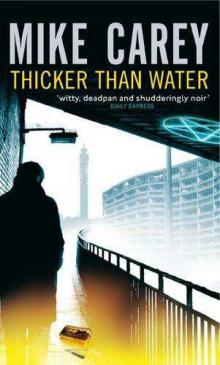 Thicker Than Water
Thicker Than Water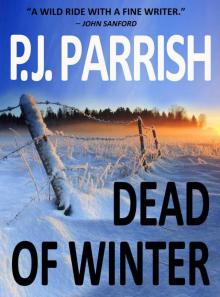 Dead of Winter
Dead of Winter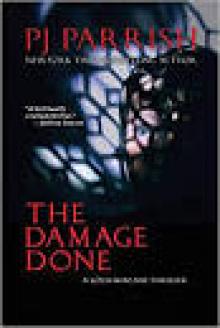 The Damage Done
The Damage Done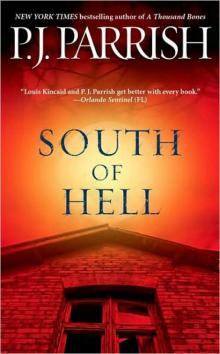 South Of Hell lk-9
South Of Hell lk-9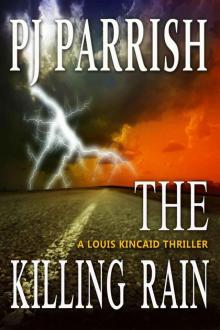 A Killing Rain
A Killing Rain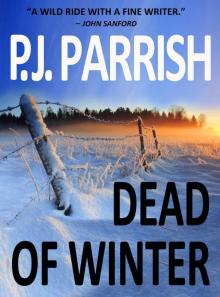 Dead of Winter lk-2
Dead of Winter lk-2 Island of Bones
Island of Bones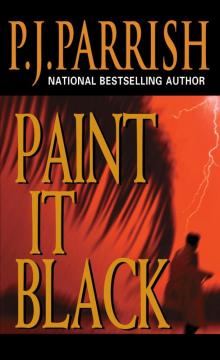 Paint It Black
Paint It Black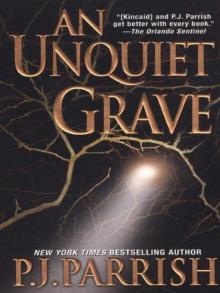 An Unquiet Grave (Louis Kincaid Mysteries)
An Unquiet Grave (Louis Kincaid Mysteries) She's Not There
She's Not There